Pynshngainlang N Syiem tours through Kripa Victoria Senior Citizens’ Home sharing a Glimpse of Caring for senior citizens
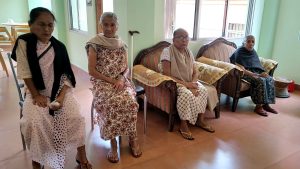
Meghalaya, a land predominantly inhabited by the Khasi, Jaintia, and Garo communities,
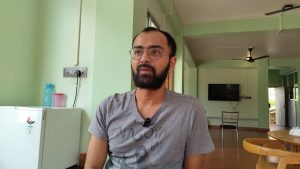
has long practiced a matrilineal system of inheritance. In this tradition, the youngest daughter inherits her parents’ property and becomes responsible for their care in their old age. However, with changing times and the pursuit of careers and financial stability, the age-old practice of the khun khatduh (youngest daughter) taking care of her parents has, over the years, marked a shift. The practice, even though still prevalent, is seemingly diminishing.
A major factor which might be contributing to this change is the urban-rural divide. In rural areas, parents often have more offspring, increasing the likelihood that one of them will provide care during old age. In contrast, urban parents typically have fewer children, who may get a job or marry and live elsewhere, leaving them without immediate familial support. This situation highlights the complexities of having fewer or more children and their implications on elderly care. Kripa Victoria Senior Citizens’ Home in Ri Bhoi is a culmination of this outcome.
Currently, Kripa Victoria Senior Citizens’ Home houses six inmates, with two in semi-private rooms and four in the dormitory. Among them, the oldest is Binamary Nongsiej, aged 95, from Mawlyngbna, followed by Phri Kharsyntiew, 89, from Garikhana Shillong, Klosida Kharshiing, 84, from Mawiongrim, Neij Nongkhlaw, 89, from Sohra, and Lily Kharpor, 61, from Nongrah.
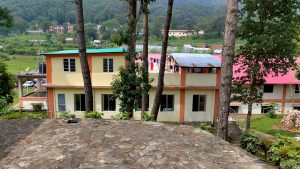
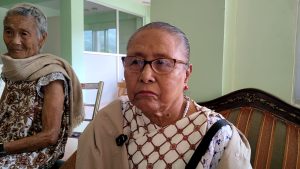
Interviews with the inmates shed light on their experiences and journey up till the Home. Rubymary Kharpor, 79, from Umsohsun, shared her story of staying in the semi-private room due to a leg fracture. She expressed gratitude for the care provided at the home, emphasizing her desire not to burden her children with long hours at work.
Another inmate, 95 years old, Binamary Nongsiej, hailing from Mawlyngbna, who has no
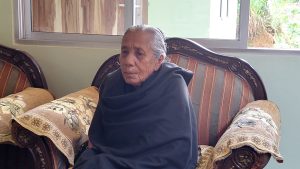
family to care for her, was brought to the Home by church elders and expressed happiness at the love and care she received. Others at the home shared similar sentiments, highlighting the newfound joy and sense of belonging.
Located amidst the serene surroundings of Nongsder village in Ri Bhoi District, a few meters away from the Shillong Bypass road, Kripa Victoria Senior Citizens’ Home stands as a beacon of hope, providing elderly vulnerable citizens love and dignity. The home offers top-notch facilities, including trained caregivers, nurses, and doctors.
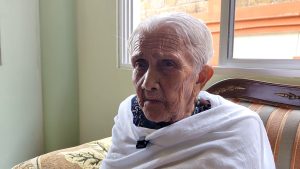
Founding the Home
The brainchild of Victoria Wallang, associated with Kripa Foundation, Kripa Victoria Senior Citizens’ Home was inaugurated in August 2022, marking one year of dedicated service. While those below the poverty line receive free care in the dormitory, charges apply to occupants of private rooms and cottages, supporting the home’s sustainability.
In a candid and heartwarming conversation with Sherrard Wahlang, we delve into the genesis of the KRIPA Victoria Senior Citizens’ Home, a beacon of hope for the elderly in Shillong. Sherrard, the son of the indomitable Victoria Wahlang, shares his family’s vision and passion that brought this institution to life.
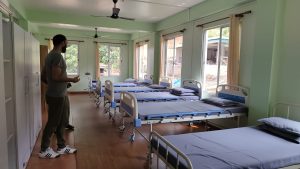
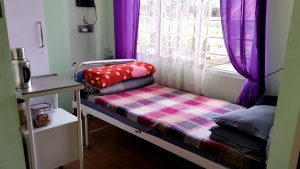
The story of KRIPA Home begins with a noble vision, one deeply rooted in compassion and empathy. Sherrard Wahlang takes us on a journey to understand the inception of this remarkable endeavor.
“So, I have never told my mother this,” Sherrard begins with a hint of nostalgia in his voice. The tale unfolds with the blessings of Father Joe, the visionary founder of Kripa Foundation, a renowned organization dedicated to the rehabilitation of individuals struggling with addiction. This organization, which has transformed countless lives, was to serve as the cornerstone for a more ambitious dream – the Kripa Victoria Senior Citizens’ Home.
The dream had been brewing for years, nurtured by Sherrard’s mother, Victoria Wahlang. She envisioned a place where elderly individuals, often marginalized and neglected, could find not just shelter but a place of dignity, comfort, and care. However, it was a dream laden with challenges, and the journey towards its realization was a gradual one.
Sherrard recounts the early days when the foundation began constructing the rehabilitation center. Progress was slow, financed largely through donations. His mother Victoria had always harbored the dream of creating the senior citizens’ home, but the question was when and how it would come to life. When she visited the construction site, she was astonished to find that more than 70% of the structure had already been completed. The journey of transforming this dream into reality had begun.
The home was ready for occupancy in March 2020, initially with the ground and first floors fully furnished, featuring a recreational hall, dormitory, and semi-private rooms. However, the COVID-19 pandemic struck, causing an unexpected delay in the grand opening. The team at KRIPA Home decided to exercise caution and postponed the opening, as the full extent of the pandemic was yet to be understood.
The Idea
The fundamental principle behind this initiative was to provide the best possible care to those in need. Just like Mother Teresa’s vision to help the poorest of the poor, the team at KRIPA Home aimed to extend a helping hand to underprivileged senior citizens while providing them with the best amenities. Sherrard explains, “Our idea was not to do volume; we wanted to give the best of the best.” This commitment to excellence extended to the quality of the infrastructure, including clean and hygienic living spaces, high-quality beds, proper mattresses, and well-maintained bathrooms.
With an ethos firmly rooted in compassion, the foundation’s vision transcended societal norms. They aimed to uplift the poverty line for senior citizens, ensuring that even those with limited resources could experience a dignified and comfortable life.
The capacity of KRIPA Victoria Senior Citizens’ Home is carefully designed to accommodate eleven individuals. This includes seven dormitory residents, four in semi-private rooms, and two cottages for single or double occupancy. While the official age requirement is above 65 for female residents, the foundation has made exceptions for special cases, such as a 61-year-old cancer patient in need of intensive care. Sherrard clarifies that their primary focus has been to cater to all communities, but surprisingly, all residents have been Khasis from Shillong.
The process of selecting residents is rigorous, with stringent criteria for BPL (Below Poverty Line) families. To be eligible for free accommodation, applicants must provide detailed financial information, including bank account details. This ensures that the residents are genuinely in need and have no other substantial resources at their disposal. Families must also commit to transferring any land or property ownership associated with the resident to their children, grandchildren, or, as the case may be, to prevent potential legal complications in the future.
However, for residents in private rooms, the criteria differ, as the responsibility for their health and well-being rests primarily with their families. The foundation aims to ensure that all residents, irrespective of their status, receive the highest quality of care and attention.
A Home is ready
The KRIPA Home offers a range of facilities and services to its residents, encompassing comprehensive healthcare support. It includes round-the-clock nursing care, wheelchair accessibility, and customized meals prepared to cater to the specific dietary needs of the elderly. Moreover, a team of professionals, including counselors, a psychiatrist, and a general practitioner, visits the home regularly to provide healthcare services and emotional support.
Beyond healthcare, the residents are encouraged to engage in various activities to keep them active and happy. Gardening, crocheting, and kitchen assistance are some of the activities that residents enjoy. The home strives to create a vibrant, nurturing, and fulfilling environment for all who call it their temporary abode.
The transition to a senior citizens’ home can be a major life change, and like any other place, minor complaints are inevitable. These could range from the weather being too hot to occasional hiccups in meal preparation. However, Sherrard emphasizes that the residents are genuinely happy and satisfied with their stay. He proudly mentions the remarkable transformation in the residents’ physical and emotional well-being, evident in before-and-after photographs.
The compassionate staff and caregivers play a pivotal role in creating this positive environment. They undergo rigorous training and selection processes, ensuring that they are well-equipped to provide the best care. Nurses receive specialized training to cater to the unique healthcare needs of the elderly, while experienced and compassionate bath nurses ensure the residents’ comfort. Additionally, counselors, with backgrounds in social work, engage the residents in various activities, encouraging them to remain active and fulfilled.
The growth and evolution of KRIPA Victoria Senior Citizens’ Home since its inauguration in August 2022 have been substantial. Sherrard reflects on the initial skepticism and the perception of a taboo surrounding private senior citizens’ homes. ‘So, when we opened this home, we actually thought that we would have a lot of non-tribals being part of our community,’ Sherrard said. Contrary to expectations, the home has primarily served the local Khasi community, challenging misconceptions about the need for such institutions.
The application process has been stringent, with numerous criteria to fulfill, resulting in more than 35 rejections out of over 40 applications received. The gradual intake of clients, with one admitted every 45 days, has allowed the foundation to scrutinize the candidates thoroughly, ensuring that the residents truly belong and will be well cared for. The home has also been instrumental in rescuing elderly individuals from abusive situations and providing them with a safe and nurturing environment.
Looking to the future, Sherrard envisions expanding the services of the foundation. He hopes to establish a basic medical setup within the premises, featuring services such as pathological labs, x-rays, dental care, and engaging healthcare professionals with this society. Furthermore, the vision extends to creating a geriatric ward and emergency care facilities to serve the residents as well as the adjoining villages nearby, such as MIDC, Umiam, Bhoirymbong, and others, which will enable people from these areas to access treatment. This expansion could be a game-changer for the elderly population, offering vital medical support and emergency care without the need for long and arduous journeys to distant hospitals in the city.
As Sherrard reflects on the remarkable journey of KRIPA Home, he shares a profound message with our readers. He urges us all to focus on making a difference one day at a time, a philosophy that has driven his family’s mission. By spreading kindness, compassion, and smiles, we can create a happier and more harmonious society. He also encourages the youth to channel their energy and passion towards social responsibility, emphasizing that true satisfaction comes from giving back to the community.
In a world often marred by the challenges of caring for the elderly, the KRIPA Victoria Senior Citizens’ Home stands as a shining example of love, compassion, and dedication. Sherrard Wahlang and his family have transformed a dream into a reality that not only caters to the elderly but also redefines the possibilities of care and compassion in society. With the unwavering support of the community and a vision to expand their services, the future holds great promise for KRIPA Home, where the elderly are not just residents but cherished members of a larger family.
Photo captions to be matched with print edition:
Binamary Nongsiej (95) from Mawlyngbna
Neij Nongkhlaw (89) from Sohra
Chapel of the Home
Sherrard Wallang
Rubymary Kharpor (79) from Umsohsun
Inmates at the Kripa Victoria Senior Citizen’s Home



